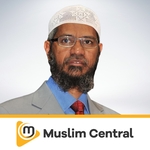Zakir Naik – Good Deeds on Eidul Adha

AI: Summary ©
AI: Transcript ©
Let me tell you the salient features
that should be done on either Adha or
Yamun Nhar. Number 1,
that have a bath early in the morning.
Number 2, put perfume
on yourself. It's a sunnah.
Number 3
is that wear the best of your clothes.
Number 4,
say the
turbiraat. Number 5,
preferable,
do not eat anything before
the Eid prayer.
Number 6, go to pray early.
Number 7,
that
it is recommended
that all the women, including the children,
including the menstruating women, should go for the
Eid salah even if they don't have to
offer salah or they don't have to go
to the Musalla.
And when you come back from Eid prayer,
see to it that you take another route,
not the same route
in which you went for the I salah
and preferable to pray I salah in a
musalah in an open ground, which is called
an ithqa.
Now what is the reason
that a beloved prophetessallahu alaihi wasallam
recommended that all the women and the children,
including the menstruating women,
should go for the it salah even if
they don't have to offer salah, even if
they don't have to go and pray. What
is the reason? Why the prophet said that
you go from one route and when you
come back, take the other route? Route? Why
did he say that pray in a large
place, idkah?
For all this, we come to know that
the reason is
so that
it boosts the morale of Muslims.
Normally, we Muslims
offer 5 times salah in congregation in the
mosque.
Once a week in Jum'ah, we have a
bigger congregation. We pray in the Jum'ah Mosque.
The congregation is multiple times bigger than what
congregation we are doing the 5 times salah.
And twice in the year, during the Iden,
the Idul Fitr and Idul Adha, the prophet
recommended that to pray in an open ground
known as the idga.
Why? So that a larger number can gather.
Imagine
if you're living in a village
and during the Easter, I come to know
there are 30,000 Muslims. There are 40,000 Muslims.
The morale
of the Muslims is boosted. And if you
are living
in an area which has a good non
Muslim also, the non Muslims will think 10
times before interfering with the Muslims. Oh, the
Muslims are 30,000 in number, 40,000 in number.
Imagine if you're living in a big city
and if you prayed 1 idga in which
100,000 gather
or a few 100,000 gather. Imagine the scenario.
It will boost up the morale of the
Muslims
and at the same time
would give a non Muslim
thought that they better not interfere with Muslims.
This is the psychology for which
what is the reason that the beloved prophet
even told the woman and the children to
go, even the woman in the menstruating?
Pray in idga.
When you go through one way, come through
the other way. Not the same way. Why?
So that the other people in the other
locality
of that village, of that town, or that
city know,
The Muslims are going in large numbers. If
you go through route a, come back through
route b so that the people of route
a also come to know. The people of
route b also come to know that Muslims
are in large number.
The next important point, when you come back,
if you have the means, you sacrifice an
animal.
If Allah has given you the means.
Later on, you go and meet
your family friends
at the day of celebration. And when you
meet,
the greeting is
May Allah
accept the good deeds from us and from
you.
Normally, in India, Pakistan, they say or
other word, the sunnah is to wish
Oh
Allah, accept
the good deeds from us and from you.
You can say
it. It is.
The right thing is as the Sabas wished
each other.
And
the day of Eid, this should be a
day of celebration.
Be happy. Be cheerful.